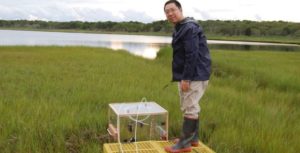 WOODS HOLE – Coastal wetlands provide stunning views and are hosts to a vast biodiversity.
WOODS HOLE – Coastal wetlands provide stunning views and are hosts to a vast biodiversity.
They also capture carbon from the atmosphere and sequester it in their sediment at high rates.
In the United States alone, coastal wetlands can offset the yearly carbon dioxide emissions from 800,000 cars.
New research from the Marine Biological Laboratory demonstrates that the wetlands will prevail over rising sea levels and climate change.
“We found that even though sea level will continue to rise at different rates, sediment accrual rates in coastal wetlands will outpace sea level rise,” said MBL Ecosystems Center scientist Jianwu Tang.
The carbon sequestered in coastal wetlands will stay locked away as new sediment deposits on top, allowing the marshland to act as a vault for excess carbon in the environment, the study found.
Although coastal wetlands cover only two percent of the ocean surface, they are estimated to sequester more than 50 percent of the carbon captured by the ocean per year.
The Marine Biological Laboratory is dedicated to scientific discovery, exploring fundamental biology, understanding marine biodiversity and the environment, and informing the human condition through research and education.
Founded in Words Hole in 1888, the Marine Biological Laboratory is a private institution and an affiliate of the University of Chicago.
For more information, visit MBL.edu.
























